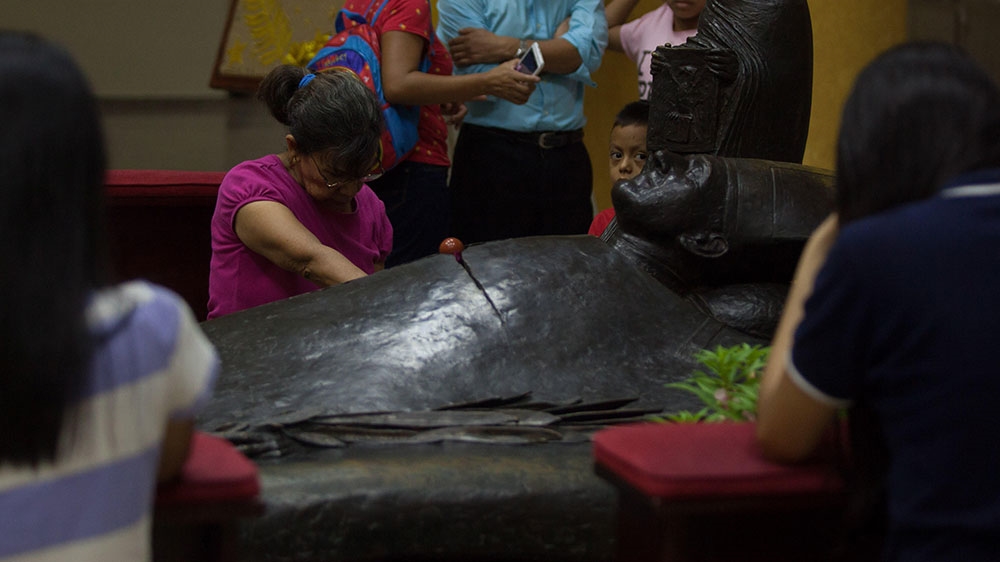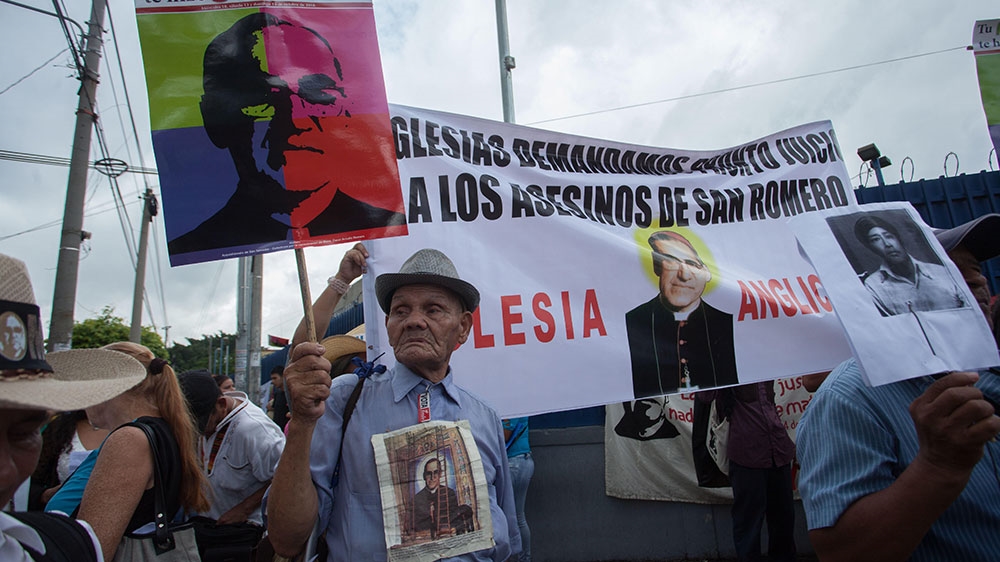El Salvador’s slain Archbishop Oscar Romero to be made a saint
San Salvador – Nearly four decades after his assassination, Father Oscar Romero, the former Archbishop of San Salvador who was killed by suspected right-wing paramilitaries in 1980, will be proclaimed a saint by Pope Francis in Rome on Sunday.
Romero will be canonised along with six others.
His canonisation is widely celebrated by the people of El Salvador. Images, art, and graffiti of the archbishop mark nearly every street across the capital city.
“We have waited many years for this,” Maura, a 67-year-old woman from Suchitoto, Cuscatlan who declined to provide her last name for security reasons, told Al Jazeera. “From the day he was killed, we said [Romero] was a saint.”
Who was Archbishop Oscar Romero?
Romero was born in 1917 in Ciudad Barrios in the department of San Miguel in southern El Salvador. The Roman Catholic Church ordained him a priest at the age of 25, prior to his return to El Salvador in 1943.
He was appointed as the Archbishop of San Salvador in February 1977 after nearly 20 years working as a priest in San Miguel, the capital of the department bearing the same name. El Salvador’s ruling elite viewed Romero as someone who would deter the growing Liberation Theology.
Yet as tension continued to escalate in the country, Romero became known as a staunch advocate of human rights and the plight of the poor, consistently denouncing the violence carried out by the Salvadoran military and paramilitaries against civilian populations.
His words gained Romero many enemies within the dictatorship. He was assassinated on March 24, 1980 while holding mass in the Church of the Divine Providence in San Salvador.
The day before his funeral, he delivered a powerful sermon in which he spoke directly to Salvadoran soldiers.
“In the name of God … I beg you, I beseech you, I order you to stop the repression,” he said.
 |
| A woman prays at the crypt of Oscar Romero in the National Cathedral of San Salvador [Jeff Abbott/Al Jazeera] |
Romero’s funeral, attended by thousands, was also targeted by snipers. At least 40 people were killed.
His death marked the beginning of El Salvador’s 12-year-long civil war, which killed more than 75,000 people and disappeared thousands more.
“Romero is an international icon for those who work for peace and justice,” Domingo Solis, a Franciscan priest in San Salvador, told Al Jazeera. “We are called to follow and put in practice his example.”
No one prosecuted
Any attempts to prosecute the intellectual authors of the murder in El Salvador were derailed in 1993, with the passing of an amnesty law, which provided amnesty for those of committing war crimes. The law subsequently closed all investigations into crimes committed during the civil war.
In 2016, the amnesty law was declared unconstitutional by the country’s Constitutional court. The repeal of the law permitted the reopening of the investigation and prosecution of war crimes, including the assassination of Romero, which was reopened in 2017.
While no one has been prosecuted in El Salvador for the assassination in the country, Major Roberto D’Aubuisson, a former death squad leader and founder of the right-wing Nationalist Republican Alliance party, or ARENA, is widely seen as being the one who ordered the assassination of Romero. D’Aubuisson died in 1992 from cancer at the age of 48.
 |
| More than 100 people gathered outside the court this week to demand the advancement of the case into the investigation into the assassination of Romero [Jeff Abbott/Al Jazeera] |
Alvaro Saravia, a former captain in the Salvadoran air force who was recruited by D’Aubuisson, was also named as one of the participants in the assassination. In 1987, he faced extradition from the United States and prosecution in El Salvador for his part in the murder, but the extradition order was later withdrawn.
Ahead of Sunday’s canonisation, more than 100 Salvadorans from a diverse group of organisations, marched through the streets of San Salvador to demand the advancement of the investigation into the assassination of Romero.
Ovidio Mauricio, the director of Tutela Legal María Julia Hernandez, a San Salvador based human rights organisation, said they wanted to case solved as quickly as possible.
“Romero was someone who always struggled against injustice and for social justice,” Mauricio told Al Jazeera. “This is why the people respect him, and why was a saint long before.”





